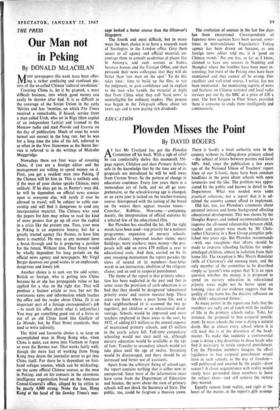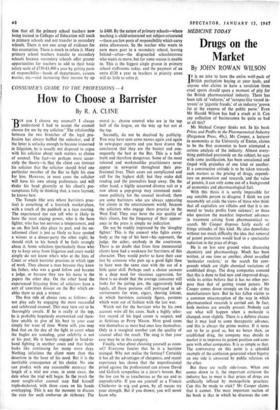Plowden Misses the Point
EDUCATION
By DAVID ROGERS
But Plowden has excelled the lot. All the right words have been used—top priority for a national programme; expansion of nursery schools; smaller classes; improved teacher status; more buildings; more teachers; more money—the pro- posals will add an extra £79 million a year to educational costs. And then, carried on by its own sweeping momentum the report parades the views of several of its members—four-letter words in sex instruction; abolition of the religious clause; and an end to corporal punishment.
The theme of the report is that primary educa- tion has been neglected in the past and that in some areas the provision of such education is so bad that they should be designated 'educational priority areas' and receive massive help. These areas are those where a poor home life, and a bad neighbourhood (it is assumed the two go together), put children at an educational disad- vantage. Schools would be improved and more teachers employed in these areas to the cost, by 1972, of adding £11 million to the annual expense of maintained primary schools, and £3 million to the yearly salary bill. Full-time compulsory schooling would not start until six, although nursery education would be available at the age of four. Transfer to secondary schools would not take place until the age of twelve. Streaming would be discouraged, and there should be an increased and better use of assistants.
Apart from the arbitrary fixing of school-ages the report contains nothing that is either new or unexpected. Since most of the information must have come from the Department of Education and Science, the news about the state of primary schools will not shock the Secretary of State. The public, too, could be forgiven a massive yawn. There is hardly a local authority area in the country without its falling-down primary school —the subject of letters between parents and local MPs. And, since the publication a few years ago of the National Union of Teachers' report State of our Schools, there have been constant headlines in the press about schools with open lavatories and the like. The problem was appre- ciated by the public and known in detail to the Department. What was needed were some practical solutions, not a report that it is ad- mitted the country cannot afford to implement.
Old hat, too, are Plowden's comments about parental interest and home background affecting educational development. This was shown by the Douglas Report, and indeed recommendations to improve the all-round relationship between child, teacher and parent were made by Mr Chris- topher Chataway in a Bow Group pamphlet pub- lished two years ago. But Plowden recommends —with one exception—that efforts should be made to improve schooling facilities for under- privileged children, almost in isolation from their home life. The exception is Mrs Moyra Bannister (wife of Chataway's old running mate, and the only member of the committee to be described simply as 'parent') who argues that 'It is an open question whether the money it is proposed to spend on nursery education in educational priority areas might not be better spent on housing, since all our evidence suggests that the quality of the home has the decisive influence on the child's educational future.'
At many points in the report one feels that the members are sadly out of touch with the realities of life in the primary schools today. Take, for instance, the proposal to ban corporal punish- ment. In most schools the cane is dying a natural death. But in almost every school where it is still used this is at the discretion of the head- master. To make this suddenly a controversial issue is doing a big disservice to those heads who find it necessary to retain corporal punishment. Can the Plowden members imagine the effect legislation to ban corporal punishment would have in such schools, as the day of freedom— well publicised and awaited by the pupils—drew nearer? A closer acquaintance with reality would surely have persuaded these members to leave the subject alone—and still achieve the victory they wanted.
Equally remote from reality, and right at the heart of the matter, is the report's glib assump- lion that all the primary school teachers now being trained in Colleges of Education will teach in primary schools and not transfer to secondary schools. There is not one scrap of evidence for this assumption. There is much to refute it. Many primary school teachers transfer to secondary schools because secondary schools offer greater opportunities for teachers to add to their basic salary scale of L730-£1,400 a year by getting posts of responsibility—heads of departments, careers master, etc.—and increasing their income by up to E400. By the nature of primary schools—where teaching is child-orientated not subject-orientated —there are few posts of responsibility which carry extra allowances. So the teacher who wants to earn more goes to a secondary school, leaving behind—often—the disgruntled schoolmistress who wants to move, but for some reason is unable to. This is the biggest single grouse in primary school staffrooms today, and the payment of an extra £120 a year to teachers in priority areas will do little to solve it.































 Previous page
Previous page